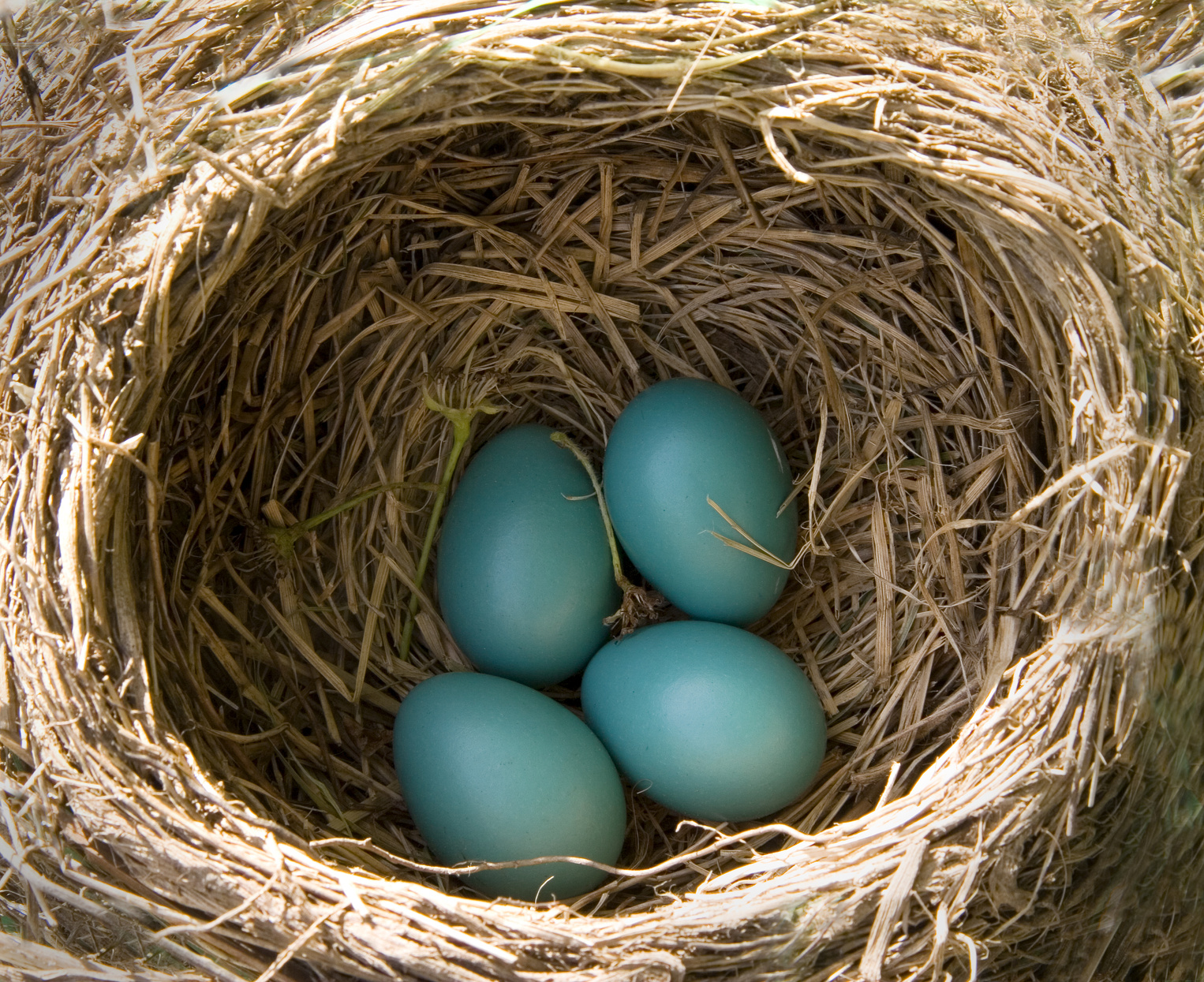
WHAT THE ROBINS TAUGHT.
"Look, Laura, just look out of the window," said Mrs. Brown one morning as the family were seated at breakfast.
All hurried to the window where'a bright, red- breasted robin was tugging with all his might at a long string fastened to one of the cherry-trees.
He tried several times to loosen it, but was not able to do so. Finally taking the end of the string in his mouth, he flew, but the little fellow was brought to a sudden stop when at the length of the string. Again he tried, only again to fail.
Then he flew away.
Soon he returned, but this time not alone.
"See, Laura, the robin has brought his mate to help him get the string." They then both took the string in their bills and started to fly, but could not break the string. "You go and untie the string, daughter, and see what they will do," said Mrs. Brown. Laura returned to the window just in time to see both robins catch the string in their mouths, and fly away in triumph with the well-earned trophy. They wanted it no doubt to finish the lining to their cozy nest.
Did you say the problem was too hard or the question too deep, my boy? Be taught by the little bird; try again and again, and then if you don't succeed, no doubt some one who loves to help those who try to help themselves will show you your way through.
C. E. H.
.jpg?timestamp=1379639619437)
BIRDS AND THEIR NESTS.
WHOEVER lives in the country without studying the birds, shuts out one source of enjoyment at least; for no one thoroughly enjoys them without in some way cultivating their acquaintance. I believe in bird's-nesting, though I do not uphold the cruel boys who rob and destroy the homes of the small feathered people; but there is a privilege of bird's-nesting, however, with which even the most tender-hearted need not be shocked. I will risk any boy or girl who carries a good heart, in any lane or hedge-row; and I will suffer them to discover and enjoy twenty bird's nests," if they are fortunate enough to find them, without any wanton destruction of eggs or birds, or any damage to their own sensibilities. If you are a real student of Nature, you will look reverently on all her wonders, as one who remembers that the Lord of creation has made special mention of his care over them.
"A sparrow shall not fall on the ground without your Father."
"The American robin, which the naturalists call Turdus Migratorius, comes early in the spring, and is found during the summer throughout the whole of North America. This little favorite of both old and young is the most familiar of all our birds, and seems to seek to place its nest where it will be under man's protection. His arrival is hailed with joy, as an unerring harbinger of spring.
But sometimes the season is late, and he finds snow and ice on his coming; but he is a brave bird, and though he goes about chirping sadly (thinking perhaps of the mistake he made in leaving his sunny southern home so early) he flies swiftly around, looking sharply with his keen brown eyes for the remaining berries on the sumac, mountain ash, and red cedar; for he well knows that "brighter days will come at last." As soon as it comes warmer, he is busy making a new home or repairing his old one; for the robin is a social little fellow, and seems to like to build in the same place year after year. That last year's, nest of moss and clay has stood the storms of fall and winter, and is as round and trim as ever, and with a few repairs, a bit of fresh clay here and there, and a new lining of fine dried grass from the hillside, is every bit as good as new.
Then come four blue eggs, a few weeks of watchful care, four open mouths to feed; and Sir Redbreast and lady have all they can do to support their little family for the next six weeks.
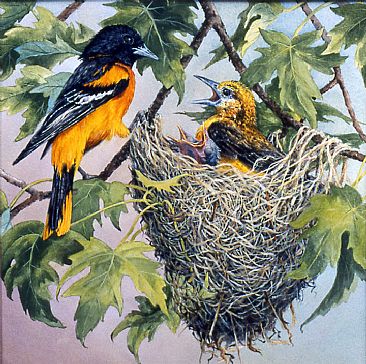
Another sociable bird is the oriole, she often hangs her pretty cradle on the end of an apple-bough. Sometimes you may find one of these wonderful hanging nests three or four feet long, sometimes only about seven inches, and nearly as wide. At the bottom of it you will find four spotted eggs, blue, if it is an orchard oriole; pink, if it is a Baltimore oriole's nest. This nest is most elaborately woven into a fabric like a plaited straw hat. A gentleman counted the stitches which an oriole had made with one long wisp of hay, and found that it had passed through thirty-four times. A lady suggested that the bird might be taught to darn stockings.
Nothing can be more confidential than the habits of the swallows, who glue their bits of
masonry by scores in our very chimneys. If you pass along the river bank, or wherever sand-hills lie, look for the bank-swallow, or sand-martin's nests. Hundreds of them burrow into the perpendicular bank, sometimes to the depth of three or four feet, and at the further end construct a nest of a little straw.
The woodpecker's nest is ingeniously built. She sounds her hammer along the limb of a tree till she finds one that betrays decay then she bores a hole down deep into the heart of the bough, and lays her four pure white eggs on the dust at the bottom.
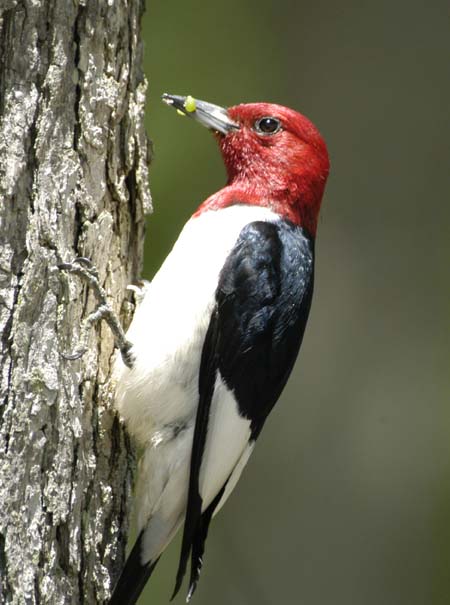
One nest was found where the bird had dug forward five inches, and then downward twice that distance, through solid black oak. At the bottom of this hole the little woodpeckers first saw twilight, daylight would hardly be expected in such a place.
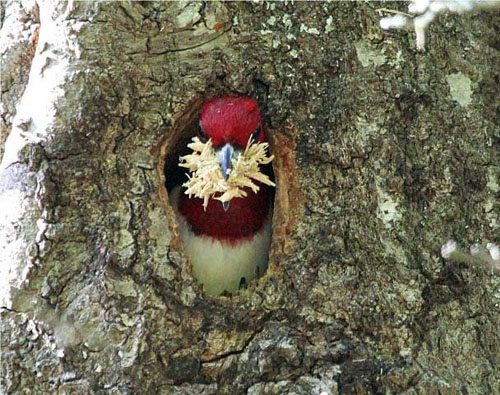
This is
the great red-headed woodpecker, who may be seen in all his magnificence, sunning himself on the fence-rails at almost any time. The house wren (Troglodytes AEDON) is a familiar and interesting little bird, common in all parts of the United States from April until the beginning of October, when it retires to the South; but the place where it winters seems yet to be unknown.
The wren is sprightly, active, and diligent. Its nest is formed with coarse sticks and shreds of bark and wood, in some cavity, such as a hollow stump, or the vacant space at the foot of a brace in the frame of a building.
You would not think of finding a bird's nest in a coat sleeve, but a wren once built there. A mower hung up his coat in a shed by the barn, where he left it two or three days. On putting it on again, he found the sleeve filled with rubbish, as he called it. He pushed it out, and behold! A wren's nest, just ready for housekeeping.

The poor little owner flew about in great trouble and surprise, but was made satisfied with an old hat nailed to the weatherboards, where she built again. Look under the eaves of the porch, or in any snug corner, for a neat little nest, quite round, with a small hole on one side; and you have a wren's nest. In it you will find from six to eight little flesh colored eggs, with purple spots.
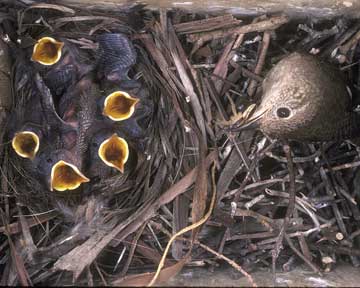
The wren is a very persevering little creature; and when its nest is destroyed, will rebuild it time after time in the same place.
Perhaps you have never heard this of the eagle and the wren.
When the world was young, there arose a great contention among the birds as to which should be king.
The eagle drew himself up in pride, flapped his monstrous wings, and in a voice that terrified the smaller birds and frightened Lady Magpie so badly that she fainted away, exclaimed: "Let this dispute be settled in this wise:
We will all start together; the one who soars the highest will forever remain your acknowledged king." They all agreed; very soon the eagle had outstripped them all, and was only a mere speck between the earth and sun. Then out spoke the bold eagle,
"Behold, I am king." Just then a little shrill voice exclaimed, "I beg your pardon; I am above you, therefore, I am king." The astonished eagle looked over his shoulder and saw a tiny wren perched upon his back.
He was very wroth and dashed the frightened little bird from him, exclaiming, "Go down to earth for your folly; you shall never fly higher than a man's head." The moral is good.
We should never aim to fly higher than our own wings will carry us. These are only a few of the many things that might be related about the birds and their queer ways; but those who will take the pains to watch the little warblers, may, before this summer is over, learn many curious things in regard to them. You will find interest enough in seeking their haunts and watching their habits without any intrusion upon their rights. Nothing pays young people better than that culture of eye and ear which springs from such rambles.
COM.
"SUMMER IS NOW NIGH AT HAND."
"Now learn a parable of the fig-tree; when her branch is yet tender, and putteth forth leaves, ye know that summer is nigh." Although we do not have the fig-tree in our country to tell us that summer is nigh, yet we have other means by which we are made aware of its approach. We watch for the return of the birds from the warm sunny south, and the putting forth of the leaves of our own native trees. The first bird that returns is the crow. We can hear his "caw, caw" about the first of March; next come the blue bird and the robin to cheer us with their happy songs.
After a few weeks the earth puts on a coat of living green; and as we see all nature springing into life, we see and know, of our own selves, that "summer is now nigh at hand." Then as we go to Sabbath-school on a bright Sabbath morning in early spring, and listen to the singing of the birds and the ripple of the rills, as they sparkle on their way; our hearts swell with gratitude to God; then we remember our Saviour's promise to come again; and we long to see him coming in the clouds of heaven to receive us to himself. Surely "summer is now nigh at hand."
A. L. P.
A REMARKABLE NEST.
THE cow-bunting of New England never builds a nest. The female lays her eggs in the nest of those birds whose young feed like her own, on insects and worms, taking care to deposit but one egg in a nest. A cow-bunting deposited an egg in the nest of a sparrow, in which was one egg of the latter.
On the sparrow's return, what was to be done? She could not get out the egg which belonged to her, neither did she wish to desert her nest, so nicely prepared for her own young. What did she do?
After consulting with her husband, they fixed on their mode of procedure. They built a bridge of straw and hair directly over the two eggs, making a second story in the house, thus leaving the two eggs below out of the reach of the warmth of her body. In the upper apartment she laid four eggs, and reared her four children.
In the museum at Salem, Mass., may be seen this nest, with two eggs imprisoned below.
Golden Days
GOD TEACHES THE BIRDS.
ON the Island of Java grows a tree, the leaves of which are said to be a deadly poison to all venomous reptiles. The odor of the leaf is so offensive to the whole snake family that if they come near the plant in their travels, they immediately turn about, and take an opposite direction.
A traveler on the island noticed one day a peculiar fluttering and cry of distress from a bird high above his head. Looking up, he saw a mother-bird hovering round a nest of little ones in such a frightened and perplexed manner as to cause him to stop and examine into the trouble. Going around to the other side of the tree, he found a large snake climbing slowly up the tree, in the direction of the little nest.
It was beyond his reach; and since he could not help the little feathered songster by dealing a death-blow, he sat down to see the result of the attack. Soon the piteous cry of the bird ceased, and he thought, "Can it be possible she has left her young to their fate, and has flown away to seek her own safety" No ; for again be heard a fluttering of wings, and looking up, saw her fly into the tree with a large leaf from this tree of poison, and carefully spread it over her little ones. Then, alighting on a branch high above her nest, she quietly watched the approach of her enemy. His ugly, writhing body crept slowly along, nearer and still nearer, until within a foot of the nest; then, just as he opened his mouth to take in his dainty little break-fast, down he went to the ground, as suddenly as though a bullet had gone through his head, and hurried off into the jungle beyond.
The little birdies were unharmed; and as the mother-bird flew down and spread her wings over them, the poison leaf (poison only to the snake) fell at the feet of the traveler; and he felt, as never before, the force and sweetness of the beautiful words, "Are not two sparrows sold for a farthing? Yet not one of them shall fall to the ground without your Father "--for who but he, who made the dear little birds, could have told this one the power there was in this little leaf?-
S. S. Advocate.